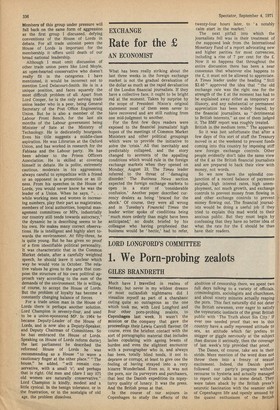EXCHANGE
Rate for the E
AN ECONOMIST
What has been really striking about the last three weeks in the foreign exchange market is not the gradual devaluation of the dollar as much as the rapid devaluation of the London financial journalists. If they have a collective face, it ought to be bright red at the moment. Taken by surprise by the scope of President Nixon's original statement most of them seem never to Wave recovered and are still rushing from one mid-judgment to another.
For the first few days readers were exposed to the financial journalists' high hopes of the meetings of Common Market Ministers and other political groupings which were to provide the initiative to solve the 'crisis.' All that inevitably and predictably collapsed, and the story changed to accounts of the appalling conditions which would rule in the foreign exchange markets when they opened on Monday, August 23. The Times leader referred to the threat of damaging disorder.' The Business News section expected the foreign exchange markets to open in a state of 'considerable confusion.' Another paper described currency dealers as being 'braced for the shock.' Of course, they were all wrong and in Tuesday's Financial Times the leader writer spoke of conditions being 'much more orderly than might have been anticipated,' no doubt briefed by his colleague who having prophesied that business would be hectic,' had to refer,
twenty-four hours later, to 'a notably calm start in the market.'
The next pitfall into which the journalists fell was in their treatment of the supposed leak from the International Monetary Fund of a report advocating new and higher parities for most currencies, including a rise of 7 per cent for the E. Now it so happens that throughout the entire discussion there has been a near consensus that whatever else happens to the E, it must not be allowed to appreciate. A Times leader under the heading "Still $2.40" approved the idea that "the old exchange rate was the right one for the strength of the E at the moment has had to be explained away either as temporary or illusory, and any substantial or permanent appreciation has been widely feared, by the financial journalists, as "detrimental to British interests," as one of them judged it. The BMF report was roughly treated. British in the medium term." The apparent
So it was just unfortunate that after a few days of this sort of stuff the Treasury moved in at the weekend to prevent funds coming into this country by imposing stiff new foreign exchange controls. Other people evidently don't take the same view of the as the British financial journalists and are prepared to back their view with money, not words.
So we now have the splendid conjunction of a record balance of payments surplus, high interest rates, high unemployment, not much growth, and exchange controls to prevent money from flowing in and other exchange controls to prevent money flowing out. The financial journalists would be doing a useful job if they tried to explain this mad world to their anxious public. But they must begin by confessing that they have no better idea of what the rate for the E should be than have their readers.


































 Previous page
Previous page